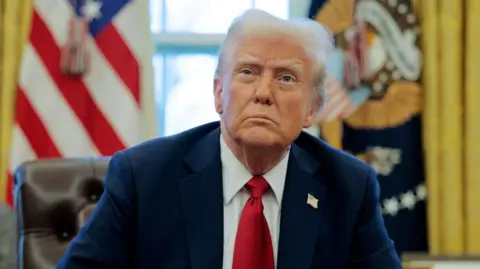What will Trump's tariffs mean for Ireland?
 Getty Images
Getty ImagesUnited States President Donald Trump has said he will "absolutely" impose tariffs on the EU, claiming the 27-country bloc has "treated us so terribly".
He has already imposed tariffs of 25% on Canadian and Mexican goods which will apply from Tuesday. Canadian energy faces a lower 10% tariff.
A tariff is a domestic tax levied on foreign goods as they enter the country, proportional to the value of the import. They are a central part of Trump's 'America First' economic vision.
Among EU countries, the Republic of Ireland could face the biggest impact if Trump extends his tariffs.
- LIVE UPDATES: Trump says he will impose trade tariffs on the EU
In 2023, the US was the number-one country for Irish goods exports, buying products worth €54bn (£45bn).
That meant 28% of Irish goods exports were sold into this one market.
Of that €54bn, about €36bn related to pharmaceuticals and chemicals, illustrating how Ireland has become a major offshore manufacturing centre for US pharma companies.
Trade surplus
What is likely to attract the attention of Trump's economic advisors is not so much the volume of goods that Ireland sells to the US, but the large trade surplus that creates in Ireland's favour.
In other words, Ireland sells a lot more to the US than it buys in return.
In fact, official US data suggests that only China, Mexico and Vietnam have a bigger trade surplus with the US.
What may also catch the eye of Trump's advisors is how much tax big US pharma companies are paying in Ireland, having structured their operations to take advantage of Ireland's relatively low corporation tax regime.
Researcher Brad Setser, who works for the Council on Foreign Relations, has doggedly tracked the activities of the pharmaceutical companies.
In 2023, in evidence to the US Congress finance committee he said: "There is no plausible explanation for the current scale of US imports of pharmaceuticals from Belgium, Ireland, Switzerland, and Singapore that isn't tied to tax avoidance.
"The net result is a loss of tax revenue for the US Treasury and a smaller biopharmaceutical industrial base. This clearly leads to a less resilient US economy."
All this makes Ireland a potential target, although there is no sign yet that the country will be singled out among EU members.
EU's 'collective action'
On trade, the EU will always take collective action.
Trade policy is what is known as an "exclusive competence" meaning that only the EU can negotiate trade deals and impose tariffs, rather than individual states.
However that does not preclude the Irish government from making its own diplomatic efforts.
"We can do business with the Trump administration," Ireland's Foreign Minister Simon Harris said.
"My country has done business with every US administration, and there'll be challenges, but we've got to control them."
Harris said he also planned establish a new trade consultative forum to engage with US multinationals operating in Ireland.
 Getty Images
Getty ImagesThe aim of that body seems to be to reassure those businesses and persuade them not to do anything hasty with their Irish operations.
The UK government seems to hope it can still avoid being hit with US tariffs, but a US-EU tariff war will still have implications for Northern Ireland.
The Windsor Framework, Northern Ireland's Brexit deal, means it is essentially still inside the EU's single market for goods and enforces the EU's customs code.
Goods which are subject to EU "trade defence measures", such as tariffs, are always considering to be "at risk" when entering Northern Ireland, meaning EU tariffs must be imposed.
That could lead to a situation where Great Britain is not applying tariffs to US goods, but Northern Ireland is.
